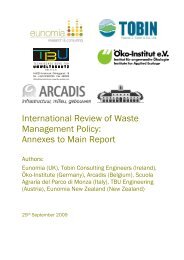Report of the Local Government Efficiency Review Group
Report of the Local Government Efficiency Review Group
Report of the Local Government Efficiency Review Group
You also want an ePaper? Increase the reach of your titles
YUMPU automatically turns print PDFs into web optimized ePapers that Google loves.
1.7 Compliance Requirements on <strong>Local</strong> Authorities<br />
1.7.1 Financial activities <strong>of</strong> local authorities are heavily influenced by<br />
mandatory compliance requirements particularly in environmental<br />
and health & safety areas, and more generally in o<strong>the</strong>r fields <strong>of</strong><br />
activity. These requirements result in significant non-discretionary<br />
expenditure that local authorities effectively have to undertake. In<br />
<strong>the</strong>se cases, local authorities are statutorily bound or obliged by<br />
national government or EU policy to incur <strong>the</strong>se costs. In many<br />
cases, non-compliance could result in fines for <strong>the</strong> Irish government<br />
or <strong>the</strong> local authority, and in some cases criminal prosecution <strong>of</strong> staff<br />
involved. <strong>Local</strong> authorities are also statutorily bound by o<strong>the</strong>r<br />
legislative provisions, such as <strong>the</strong> requirements <strong>of</strong> <strong>the</strong> Official<br />
Languages Act.<br />
1.7.2 In <strong>the</strong> field <strong>of</strong> water services, specific regulations and statutory<br />
instruments exist in several areas, such as drinking water, urban<br />
waste water treatment, surface and groundwater, bathing water, and<br />
waste water authorisation. In a typical authority, <strong>the</strong> capital costs <strong>of</strong><br />
water/ waste water plants for new and existing compliance<br />
requirements totals €60 million. In terms <strong>of</strong> waste management,<br />
recent legislative initiatives include regulations on different waste<br />
streams such as sewage sludge, mining waste, legacy waste<br />
disposal sites, tyres, electrical and electronic waste, packaging, food<br />
waste, batteries and end-<strong>of</strong>-life vehicles, as well as legislation<br />
governing <strong>the</strong> operation <strong>of</strong> waste management facilities such as<br />
landfill sites and waste to energy facilities. Health and safety<br />
requirements increasingly place a heavy financial burden on <strong>the</strong><br />
sector, having regard to <strong>the</strong> dispersed and diverse range <strong>of</strong> local<br />
authority operations, and it can be expected that this will be an area<br />
<strong>of</strong> significant continuing cost growth for <strong>the</strong> future.<br />
1.7.3 Legislation in <strong>the</strong>se fields typically implies a series <strong>of</strong> costs involving<br />
local authority capital and current expenditure in areas such as <strong>the</strong><br />
following:<br />
• New capital works in water and waste water services;<br />
• Significantly increased operating and maintenance costs due to<br />
more stringent standards;<br />
• Monitoring obligations to ensure standards are being met<br />
(monitoring functions have become more complex and <strong>the</strong><br />
frequency <strong>of</strong> analysis has increased, with protocols being<br />
developed in certain areas);<br />
• Regular sampling and testing (especially in <strong>the</strong> case <strong>of</strong> water<br />
services);<br />
• Improvement and remedial works that are required (for example<br />
in terms <strong>of</strong> water conservation);<br />
15
















